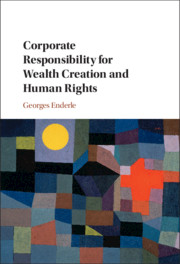Book contents
- Reviews
- Corporate Responsibility for Wealth Creation and Human Rights
- Corporate Responsibility for Wealth Creation and Human Rights
- Copyright page
- Dedication
- Contents
- Figures, Tables and Boxes
- Preface
- Acknowledgments
- 1 Introduction and Overview
- 2 The Context of Globalization, Sustainability and Financialization
- Part I Wealth Creation
- Part II Human Rights as Public Goods in Wealth Creation
- 11 All Internationally Recognized Human Rights Are at Stake
- 12 Human Rights Constitute Minimal Ethical Requirements
- 13 Cost-Benefit Considerations about Human Rights as Goals, Means and Constraints
- 14 Human Rights as Public Goods
- Part III Implications of Wealth Creation and Human Rights for Corporate Responsibility
- Bibliography
- Index of Names
- Index of Subjects
14 - Human Rights as Public Goods
from Part II - Human Rights as Public Goods in Wealth Creation
Published online by Cambridge University Press: 11 January 2021
- Reviews
- Corporate Responsibility for Wealth Creation and Human Rights
- Corporate Responsibility for Wealth Creation and Human Rights
- Copyright page
- Dedication
- Contents
- Figures, Tables and Boxes
- Preface
- Acknowledgments
- 1 Introduction and Overview
- 2 The Context of Globalization, Sustainability and Financialization
- Part I Wealth Creation
- Part II Human Rights as Public Goods in Wealth Creation
- 11 All Internationally Recognized Human Rights Are at Stake
- 12 Human Rights Constitute Minimal Ethical Requirements
- 13 Cost-Benefit Considerations about Human Rights as Goals, Means and Constraints
- 14 Human Rights as Public Goods
- Part III Implications of Wealth Creation and Human Rights for Corporate Responsibility
- Bibliography
- Index of Names
- Index of Subjects
Summary
Rarely discussed in the literature, the book defines human rights as public goods. This innovative perspective connects human rights to public wealth (see Chapter 5), characterized by non-rivalry and non-excludability and assessed as “good” – not “bad” – in ethical terms. Human rights are often understood as individual claims addressed to governments or other actors while ignoring their public good character. Some examples illustrate this widespread attitude that is only challenged when the public costs of human rights repression becomes evident. Like public goods in general, human rights can be final goods (or goals to be achieved for themselves) or intermediate goods (or means to realize other goods or rights). This means that securing human rights has far-reaching positive consequences while abusing human rights generates severe public bads by also violating other human rights and causing economic and social harm. – Due to their public good character, two wide-ranging implications follow: Human rights cannot be achieved by market institutions, but need collective actions at multiple levels of society; and self-regarding motivations alone inevitably fail to establish, fulfill and guarantee human rights, whence other-regarding motivations are indispensable.
- Type
- Chapter
- Information
- Corporate Responsibility for Wealth Creation and Human Rights , pp. 148 - 158Publisher: Cambridge University PressPrint publication year: 2021



